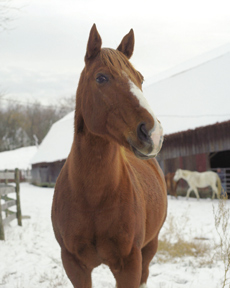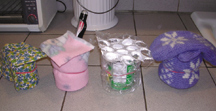|
|
 Not Just for Kids Not Just for Kids
Staying Warm
by Martha Blume
In these cold winter months, what do you do to stay warm? Do you bundle up in a coat, boots, mittens and a hat?
What do animals do to keep warm? Have you noticed that your hairy pets get fuzzier in the colder months? Mammals build up extra fur to insulate them from the cold.
 |
|
photo by Phil Hoffmann
|
Check out those birds at your bird feeder. Do those finches seem fluffier than before? That’s because, in the winter, birds fluff up their feathers, trapping body heat to keep them warmer.
What about plants? Do you think plants have strategies for keeping warm? They sure do.
Look at rhododendron leaves. The way they curl up when it’s cold is the same way you curl up to conserve heat. Can you tell the approximate temperature by looking at the leaves on your rhododendron? They’ll uncurl when it’s warmer.
Also, evergreens, trees that keep their leaves through the winter, have a protective waxy coating, like the coating we put on with hand cream to keep from drying out.
When you’re cold, try horripilating. That’s a million-dollar word that means getting goose bumps. Goose bumps make your body hairs stand on end, trapping body heat and providing an extra layer of insulation. Just like birds fluffing their feathers.
Word Attraction
Horripilating sounds pretty horrid, doesn’t it? That’s because the words — which joined the English language back in the 17th century — are related. Both come from Latin words (horripilare and horrere) meaning to stand on end or bristle. Why so similar? Because your skin reacts the same way to fear that it does to cold.
Experiment with Insulation
Try this experiment with insulation. Gather some materials — like wool, cotton, polar fleece, foam, tin foil, plastic wrap, paper or whatever else you can find around the house. You’ll also need tin cans, a candy-making thermometer (it has to go up to at least 100 degrees Celsius, the temperature at which water boils) and a teapot.
 Cover each of your cans with a different insulating material (See photo below). Predict which ones will keep you warmest. Then bring some water to boil and quickly pour it into each of the insulated cans. Measure the temperatures of the water in the cans every few minutes. Which stayed hot the longest? Cover each of your cans with a different insulating material (See photo below). Predict which ones will keep you warmest. Then bring some water to boil and quickly pour it into each of the insulated cans. Measure the temperatures of the water in the cans every few minutes. Which stayed hot the longest?
That’s the material I’d want on my body when it’s really cold out.
Now try the experiment again with just that material, but cover the top of the can too. How much longer did the water stay hot? That’s why you should wear a hat.
-
Kids’ Stuff This Week
Friday, February 6
Curious George
Gather round for stories from your favorite monkey. 10am @ Barnes & Noble, Harbour Center, Solomon’s Island Rd., Annapolis. free: 410-573-1115.
Saturday, February 7
Shoot Like an NBA Star
Ages 3-7–Show off your skills from the free-throw line. Trophies and ribbons awarded. 9:30am @ Southern Community Center, Appeal Ln., Lusby. free; rsvp: 410-586-1101.
Monday, February 9
Nature Hour
Ranger Lisa leads hour-long nature activities. Instruction, crafts and outside time. 11am @ Kinder Farm Park, 1001 Kinder Farm Park Rd., Millersville. free; rsvp: 410-222-6115.
|
|
 Not Just for Kids
Not Just for Kids


 Cover each of your cans with a different insulating material (See photo below). Predict which ones will keep you warmest. Then bring some water to boil and quickly pour it into each of the insulated cans. Measure the temperatures of the water in the cans every few minutes. Which stayed hot the longest?
Cover each of your cans with a different insulating material (See photo below). Predict which ones will keep you warmest. Then bring some water to boil and quickly pour it into each of the insulated cans. Measure the temperatures of the water in the cans every few minutes. Which stayed hot the longest?